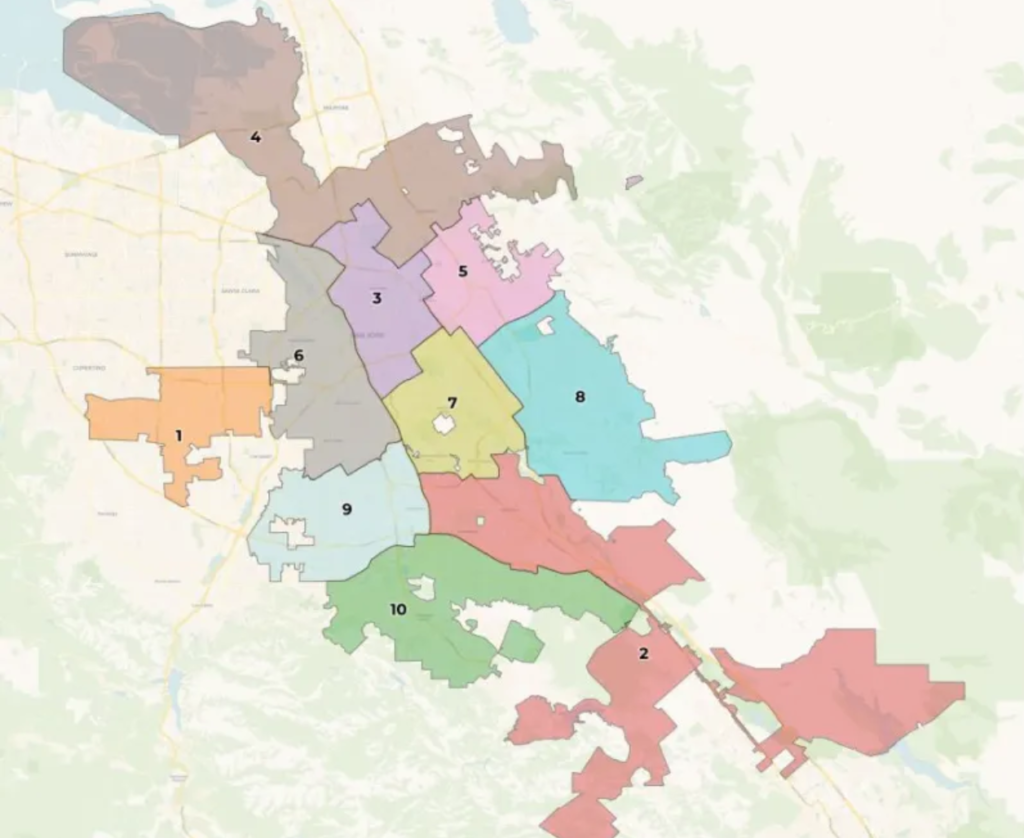
Editorial: San Jose voters should get to pick their council members

By MERCURY NEWS & EAST BAY TIMES EDITORIAL BOARD | Mercury News
A labor-backed majority of the San Jose City Council has set the stage for a power grab that would cut one-fifth of the city’s voters out of the process for picking their own council representatives.
At issue is how upcoming vacancies in two of the City Council’s 10 districts, two of the city’s most politically moderate districts, will be filled — by council appointment or by a special election. At stake is the political balance of the council and the political direction of the city.
San Jose voters should pick their representatives, not the labor-backed members of the City Council who don’t live in, represent or share the same political leanings as the two districts. The last five times the council has had a vacancy, dating back to 1995, voters have picked the replacement. That’s what fairness and democratic principles demand.
What makes this year unusual — and the council decision on the replacement process even more consequential — is that for the first time since 2006 there are two vacancies coming up at the same time. That’s because of the election of District 10 Councilman Matt Mahan to be the city’s new mayor and District 8 Councilwoman Sylvia Arenas to the Santa Clara County Board of Supervisors.
In the Nov. 8 election, voters in both districts signaled their desire for moderate city leadership by backing Mahan for mayor over labor-stalwart Cindy Chavez. Our analysis of precinct results shows that Mahan won 52% of the vote in District 8 and 63% of the vote in District 10. It would be a gross injustice for the labor-majority on the council to ignore those results and disenfranchise voters in the two districts by filling the vacancies in lieu of an election.
The city charter gives the council the option to choose either path. At a special council meeting called for 5 p.m. Monday, we will find out whether the council will do the honorable thing or run roughshod over the voters’ will. Make no mistake, with a current 6-5 majority on the council, the progressive labor faction has the votes to do the latter.
We’re not talking about someone filling out a few weeks or months remaining in a term. We’re talking about representation for two seats through the end of 2024, along with incumbency advantage in the next election. And we’re talking about determination of the balance of power on the council.
Those are decisions voters should make, not elected officials from outside the two districts. Yet we’re already hearing arguments from some for the council filling the vacancies. They warn of low voter turnout in special elections and somehow conclude that no voter turnout would be better.
They also cite the cost of the special election and a possible runoff. The debate over cost was exacerbated by a memo issued Nov. 21 by City Clerk Toni Taber putting the price tag, if there were runoffs in both elections, at $7.6 million to $11.4 million.
But Taber’s analysis originally didn’t consider the possibility of a much-cheaper, all-mail election without costly polling stations in which ballots would be returned by postal service or to drop-off locations. It’s a no-brainer solution, especially considering that 93% of San Jose voters in the last election mailed or dropped off their ballots. Saving the expense of most polling locations would cut the cost in half, according to Taber’s revised analysis and Shannon Bushey, the county registrar of voters who would administer the elections.
Of course, no one likes spending millions of taxpayer dollars. But we’re talking about the election of representatives to help manage a $6 billion annual city budget. Spending less than one-tenth of 1% of one year’s annual budget on an election is a small price for democracy.
Finally, there’s the timing issue. We’re troubled by Taber’s timeline, which at first anticipated the elections and runoffs could stretch the process until September. She now says that conducting the balloting by mail would shave two weeks off the schedule. We think there’s more room to tighten the schedule while complying with election laws.
In the meantime, if the council can unite behind interim appointees for the two seats, that’s an option worth consideration. But anyone selected should have the backing of the full council and pledge not to run in the special election. The goal should be to find placeholder appointees who would not be politically polarizing or ambitious.
And the ultimate goal should be to let the voters pick the replacements. At a time when our elections systems are under attack across the nation, we should be doing everything possible at the local level to preserve our democratic traditions.

